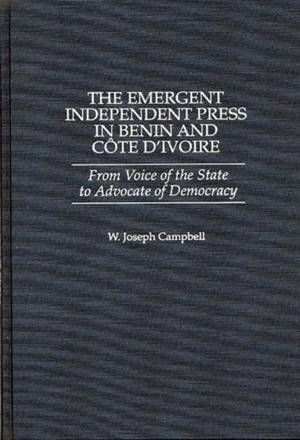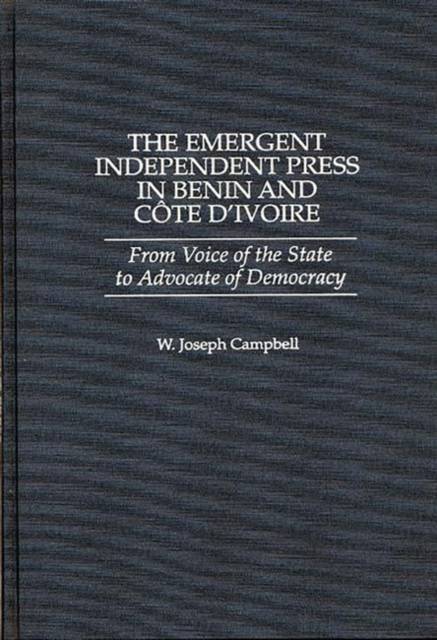
En raison d'une grêve chez bpost, votre commande pourrait être retardée. Vous avez besoin d’un livre rapidement ? Nos magasins vous accueillent à bras ouverts !
- Retrait gratuit dans votre magasin Club
- 7.000.000 titres dans notre catalogue
- Payer en toute sécurité
- Toujours un magasin près de chez vous
En raison de la grêve chez bpost, votre commande pourrait être retardée. Vous avez besoin d’un livre rapidement ? Nos magasins vous accueillent à bras ouverts !
- Retrait gratuit dans votre magasin Club
- 7.000.0000 titres dans notre catalogue
- Payer en toute sécurité
- Toujours un magasin près de chez vous
The Emergent Independent Press in Benin and Cote D'Ivoire
From Voice of the State to Advocate of Democracy
W Joseph Campbell
161,45 €
+ 322 points
Description
W. Joseph Campbell, longtime newspaper and wire service journalist, examines the origins and development of the ethos of independent journalism in two former single-party states in francophone West Africa--Benin and Côte d'Ivoire. In both countries since the late 1980s and early 1990s, a diverse and outspoken press, free of direct state control, has emerged and taken hold.
Campbell shows how the ethos of independent journalism can emerge from disparate sources and dissimilar historical legacies, despite prolonged periods of repression and autocratic rule. In Benin, the ethos of independent journalism has been shaped by traditions of expressing dissent through the press--traditions established during the long period of French rule. The etiologies of independent journalism in Côte d'Ivoire include policies of the post-colonial regime that sought to channel and constrain dissent and dissident opinion within state structures. Demonstration effects of freely circulated French-language titles also helped shape and give rise to independent journalism in Côte d'Ivoire. The dominant trend in the press in both countries has been toward daily periodicity--a trend that suggests a resilience and little-recognized hardiness of journalism in Africa. Campbell draws on extensive interviews with Beninese and Ivorian journalists to challenge the pessimism that defines most studies of Africa's press. This is an important study for scholars and researchers of journalism in the developing world, particularly West Africa, and for students of African political life.Spécifications
Parties prenantes
- Auteur(s) :
- Editeur:
Contenu
- Nombre de pages :
- 152
- Langue:
- Anglais
- Collection :
Caractéristiques
- EAN:
- 9780275963095
- Date de parution :
- 24-09-98
- Format:
- Livre relié
- Format numérique:
- Genaaid
- Dimensions :
- 162 mm x 242 mm
- Poids :
- 421 g

Les avis
Nous publions uniquement les avis qui respectent les conditions requises. Consultez nos conditions pour les avis.






